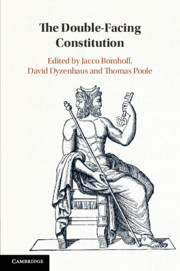Book contents
- The Double-Facing Constitution
- The Double-Facing Constitution
- Copyright page
- Contents
- Contributors
- 1 Introduction
- Part I Theoretical Foundations
- Part II Border Crossings: Comity and Mobility
- Part III The Foreign in Foreign Relations Law
- 11 Double-Facing Administrative Law: State Prerogatives, Cities and Foreign Affairs
- 12 The Democratic Challenge to Foreign Relations Law in Transatlantic Perspective
- 13 The Double-Facing Foreign Relations Function of the Executive and Its Self-Enforcing Obligation to Comply with International Law
- 14 The Various Faces of Fundamental Rights
- Index
11 - Double-Facing Administrative Law: State Prerogatives, Cities and Foreign Affairs
from Part III - The Foreign in Foreign Relations Law
Published online by Cambridge University Press: 17 January 2020
- The Double-Facing Constitution
- The Double-Facing Constitution
- Copyright page
- Contents
- Contributors
- 1 Introduction
- Part I Theoretical Foundations
- Part II Border Crossings: Comity and Mobility
- Part III The Foreign in Foreign Relations Law
- 11 Double-Facing Administrative Law: State Prerogatives, Cities and Foreign Affairs
- 12 The Democratic Challenge to Foreign Relations Law in Transatlantic Perspective
- 13 The Double-Facing Foreign Relations Function of the Executive and Its Self-Enforcing Obligation to Comply with International Law
- 14 The Various Faces of Fundamental Rights
- Index
Summary
Geneviève Cartier introduces cities ‘as both subjects and agents on the international stage’. Traditionally seen as creatures of domestic law alone, cities are increasingly actively engaged in what is sometimes called ‘local foreign policy’. The legal boundary crossings implicated in such local/foreign action require a form of ‘normative mediation’ between the different fields of law involved: local government, constitutional, and international. She develops a double-facing conception of administrative law in which these boundaries do not disappear but are revealed to be ‘more porous than is usually assumed’. The resulting processes of normative travel and transfer, as in several of the other double-facing analyses in this volume, go in two directions. External norms and practices affect the content of domestic understandings of city power, while cities rely on their traditional status in domestic law to shape their actions on the international stage.
Keywords
- Type
- Chapter
- Information
- The Double-Facing Constitution , pp. 313 - 344Publisher: Cambridge University PressPrint publication year: 2020

